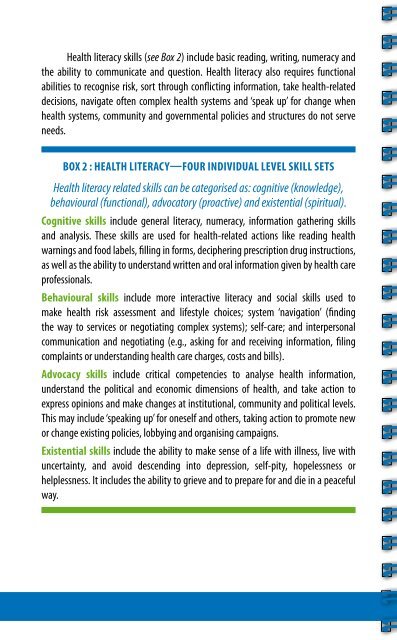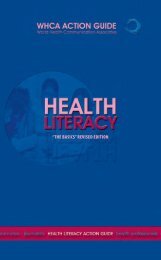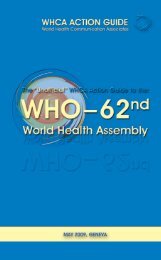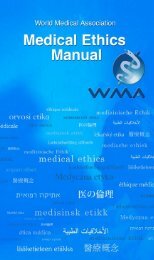Part 1 'the basics' - World Health Communication Associates
Part 1 'the basics' - World Health Communication Associates
Part 1 'the basics' - World Health Communication Associates
Create successful ePaper yourself
Turn your PDF publications into a flip-book with our unique Google optimized e-Paper software.
12<br />
<strong>Health</strong> literacy skills (see Box 2) include basic reading, writing, numeracy and<br />
the ability to communicate and question. <strong>Health</strong> literacy also requires functional<br />
abilities to recognise risk, sort through conflicting information, take health-related<br />
decisions, navigate often complex health systems and ‘speak up’ for change when<br />
health systems, community and governmental policies and structures do not serve<br />
needs.<br />
Box 2 : HeALtH LiterAcy—four inDiviDuAL LeveL SkiLL SetS<br />
<strong>Health</strong> literacy related skills can be categorised as: cognitive (knowledge),<br />
behavioural (functional), advocatory (proactive) and existential (spiritual).<br />
cognitive skills include general literacy, numeracy, information gathering skills<br />
and analysis. These skills are used for health-related actions like reading health<br />
warnings and food labels, filling in forms, deciphering prescription drug instructions,<br />
as well as the ability to understand written and oral information given by health care<br />
professionals.<br />
Behavioural skills include more interactive literacy and social skills used to<br />
make health risk assessment and lifestyle choices; system ‘navigation’ (finding<br />
the way to services or negotiating complex systems); self-care; and interpersonal<br />
communication and negotiating (e.g., asking for and receiving information, filing<br />
complaints or understanding health care charges, costs and bills).<br />
Advocacy skills include critical competencies to analyse health information,<br />
understand the political and economic dimensions of health, and take action to<br />
express opinions and make changes at institutional, community and political levels.<br />
This may include ‘speaking up’ for oneself and others, taking action to promote new<br />
or change existing policies, lobbying and organising campaigns.<br />
existential skills include the ability to make sense of a life with illness, live with<br />
uncertainty, and avoid descending into depression, self-pity, hopelessness or<br />
helplessness. It includes the ability to grieve and to prepare for and die in a peaceful<br />
way.<br />
Section 1: wHat iS HealtH literacy?






